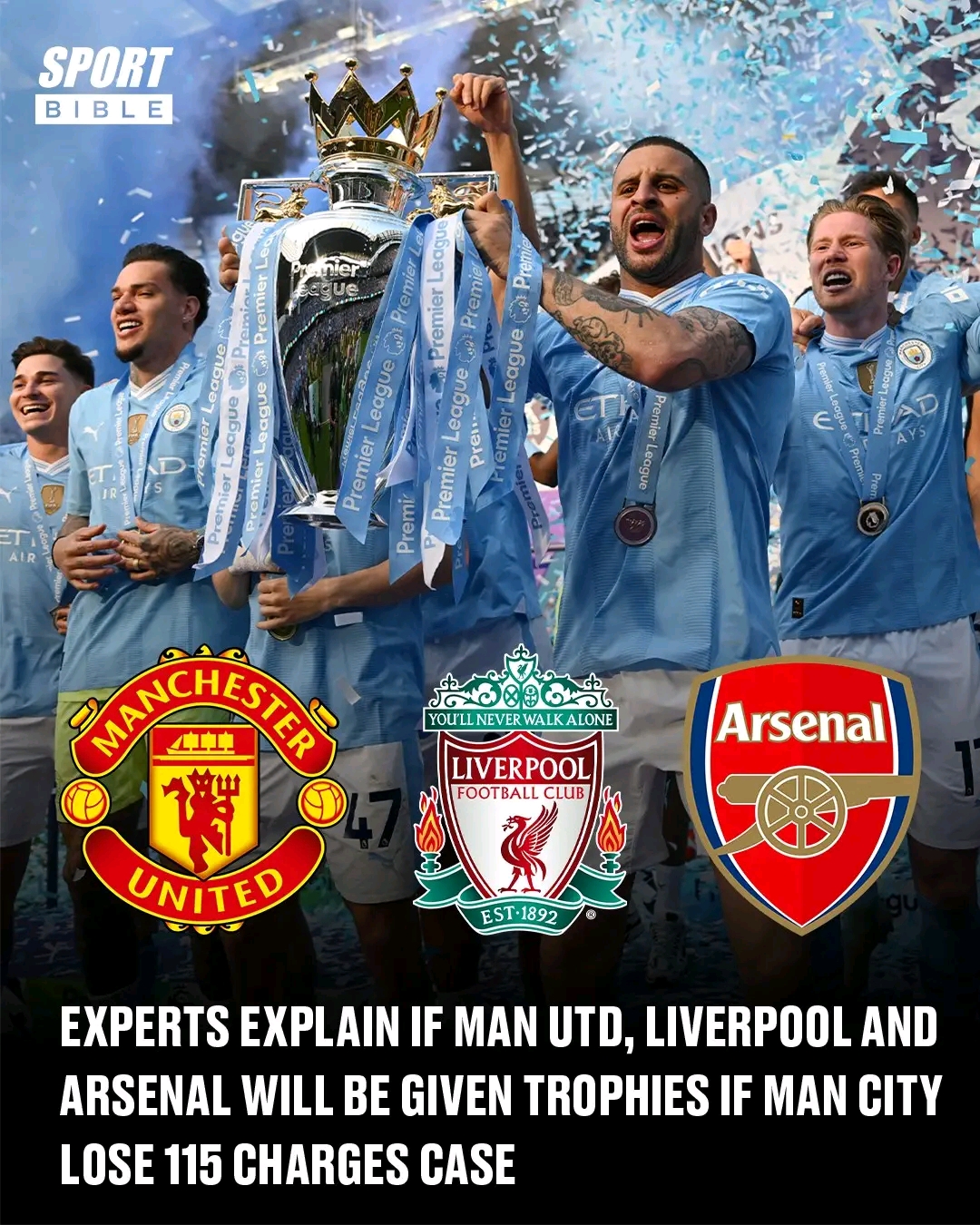The Manchester City 115 Charges Case: Will Rival Clubs Inherit Premier League Titles?

The football world continues to watch with bated breath as Manchester City’s unprecedented 115-charge case against the Premier League remains unresolved. This extraordinary situation has sparked intense debate about the potential ramifications, particularly regarding whether rival clubs like Manchester United, Liverpool, and Arsenal could retrospectively be awarded Premier League titles if City are found guilty of the charges brought against them.
The case represents one of the most significant legal challenges in modern football history, with implications that stretch far beyond the Etihad Stadium. As the football community waits for resolution, experts from various fields have weighed in on the complex questions surrounding potential punishments, title stripping, and the precedent such actions might set for the Premier League’s future.
In February 2023, the Premier League took the extraordinary step of charging Manchester City with 115 alleged breaches of financial fair play regulations. These charges span a nine-year period from 2009 to 2018, covering some of the most successful years in the club’s modern history. The allegations center around claims that City failed to provide accurate financial information to the Premier League, potentially masking the true extent of their spending and revenue streams.
The charges are particularly significant because they encompass a period during which Manchester City established themselves as a dominant force in English football. Under the guidance of manager Pep Guardiola, who arrived in 2016, and with substantial financial backing, City transformed from a mid-table club into one of Europe’s elite teams. During the period in question, they secured multiple Premier League titles, FA Cups, and League Cups, while also establishing themselves as consistent contenders in European competitions.
Manchester City have vehemently denied all allegations, maintaining their innocence throughout the process. The club has stated that they possess what they describe as an “irrefutable body of evidence” that will vindicate them when the case is finally resolved. This defiant stance has characterized City’s approach to the charges, with club officials expressing confidence that they will be cleared of all wrongdoing
The complexity of the case became apparent when private hearings commenced in December 2024. The sheer volume of documentation, financial records, and evidence involved has created a situation where legal experts suggest the process could take many months to reach a conclusion. The intricacies of financial fair play regulations, combined with the detailed nature of the allegations and the need for thorough examination of evidence, have contributed to the extended timeline.
The private nature of the hearings has meant that limited information has been made public about the proceedings. This confidentiality has only added to the speculation and uncertainty surrounding the case. Football finance experts have noted that the comprehensive nature of the charges requires careful examination of multiple years of financial data, sponsorship agreements, and internal communications.
The timeline for resolution remains uncertain, with legal experts suggesting that the judgment could still be months away. The Premier League’s process for handling such cases is designed to be thorough, ensuring that all evidence is properly examined and that any decision reached is based on comprehensive analysis of the available information
The question of whether Manchester City could be stripped of Premier League titles has generated significant debate among football finance experts and legal professionals. At the Business of Football summit in February, several prominent voices shared their perspectives on this contentious issue.
Matt Hughes, formerly of The Times and a respected football journalist, expressed skepticism about the likelihood of retrospective punishment. His assessment suggests that there appears to be “no appetite to take retrospective punishment” within the Premier League’s approach to the case. This perspective reflects concerns about the practical and legal complexities involved in unwinding past sporting achievements.
Simon Leaf, who serves as Head of Sport and Commercial & Technology Lawyer at Mishcon de Reya, provided a more cautious assessment. He indicated that it was still too early to make definitive statements about potential outcomes, but noted that certain clubs might have legitimate grievances about missed opportunities. His analysis pointed to the broader financial implications, suggesting that “certain clubs looking at this and saying, actually we would have been entitled to payments for qualifying for Champions League… or even bonuses from sponsors from finishing in a different position.” This perspective highlights the cascading effects that any retrospective changes to league standings could have. The financial implications extend beyond mere trophy presentations to include prize money, European qualification bonuses, and commercial benefits that flow from higher league positions
Perhaps the most compelling argument against title stripping comes from veteran journalist Martin Lipton, who expressed strong doubts about the likelihood of such action. His reasoning centers on the fundamental nature of football history and the Premier League’s established narrative. Lipton argued that he would be “very surprised” if City were stripped of titles, as such action would potentially undermine the Premier League’s historical integrity.
The journalist’s most striking point involved one of the most iconic moments in Premier League history. “If you were to strip titles, the single most iconic moment in the history of the Premier League – Sergio Aguero’s 94th minute goal against QPR to win the league – didn’t happen,” Lipton observed. “You can’t rewrite history to that extent.”
This argument touches on something deeper than legal technicalities or financial regulations. Aguero’s dramatic goal in May 2012, which secured City’s first Premier League title in the final seconds of the season, has become legendary in football folklore. The moment is widely regarded as one of the most dramatic conclusions to any football season, anywhere in the world. The goal not only won City the title but also denied Manchester United, creating a narrative that has been replayed countless times in football documentaries and retrospectives.
Lipton’s categorical statement that title stripping is “not going to happen” reflects this view that certain sporting moments transcend the legal and administrative frameworks that govern the sport. The suggestion is that the Premier League would be reluctant to effectively erase such moments from its history, regardless of the legal findings.
The debate around potential title redistribution gained additional color from comments made by Jose Mourinho in October 2024. The Portuguese manager, known for his outspoken nature and psychological warfare tactics, provided a characteristically direct perspective on the situation. Speaking in a press conference, Mourinho referenced his time as Manchester United manager during the 2017/18 season, when his team finished second to City.
“I think we still have a chance to win that league because maybe they punish Man City with points, and maybe we win that league. Then they have to pay me the bonus and give me my medal,” Mourinho stated with his typical blend of humor and seriousness.
While Mourinho’s comments were likely made with tongue firmly in cheek, they highlight the personal stakes involved for managers, players, and clubs who finished behind City during the period in question. The financial and emotional implications of retrospective title awards would be significant for all parties involved
Mourinho’s Manchester United team accumulated 81 points during the 2017/18 season, finishing 19 points behind City’s record-breaking 100-point campaign. That City team, in Guardiola’s second season, was widely regarded as one of the finest Premier League teams in history, combining attacking flair with defensive solidity in a way that few teams have managed
The Manchester City case has implications that extend far beyond the specific charges and potential punishments. The outcome could set precedents for how financial fair play violations are handled in the future, potentially influencing the behavior of clubs across not just the Premier League, but European football more broadly.
The case has also raised questions about the effectiveness of financial fair play regulations and their enforcement. Critics have argued that the regulations, while well-intentioned, have been inconsistently applied and have failed to prevent the financial inflation that has characterized modern football. Supporters of the regulations, however, view the City case as evidence that the system can work when properly enforced.
The delay in reaching a resolution has itself become a talking point, with some critics suggesting that the lengthy process undermines the credibility of the regulatory framework. Others argue that the complexity of the case necessitates a thorough approach, and that rushing to judgment would be inappropriate given the serious nature of the allegations.
While much attention has focused on the possibility of title stripping, the financial implications of the case extend far beyond trophy presentations. Simon Leaf’s comments about clubs potentially being entitled to Champions League qualification payments and sponsor bonuses highlight the complex web of financial relationships that surround modern football success.
The Premier League’s prize money structure means that each league position carries significant financial value. Teams that finish higher in the table receive larger payments from the Premier League’s central fund, while also benefiting from enhanced commercial opportunities. European qualification, in particular, brings substantial financial rewards through UEFA’s prize money structure and increased commercial appeal.
If City were found guilty and subjected to retrospective punishment, the financial implications could be enormous. Clubs that missed out on European qualification during the period in question could potentially claim compensation for lost revenue. Similarly, clubs that were relegated or missed out on promotion due to City’s alleged rule breaches could have grounds for significant financial claims.
The complexity of unwinding these financial relationships would be unprecedented in football history. The interconnected nature of modern football finance means that any retrospective changes to league standings could have far-reaching consequences across multiple seasons and involving numerous clubs
At the heart of the Manchester City case lies a fundamental question about competitive integrity in professional football. The charges suggest that City may have gained an unfair advantage through alleged financial rule breaches, potentially distorting competition during a crucial period in the Premier League’s development.
The concept of competitive integrity is central to the legitimacy of any sporting competition. Fans, players, and clubs invest emotionally and financially in the belief that competitions are conducted fairly and that success is determined by sporting merit rather than rule violations. If the charges against City are proven, it would raise serious questions about the integrity of multiple seasons of Premier League competition.
However, the practical challenges of addressing historical integrity violations are immense. Unlike doping cases in individual sports, where results can be more easily adjusted, team sport victories involve complex webs of individual performances, tactical decisions, and collective achievements that cannot be easily separated from any underlying rule violations.
The Premier League has built its reputation on the premise that it represents the pinnacle of competitive football. The City case tests this reputation in ways that the league has never previously faced. The outcome could influence how fans, players, and commercial partners view the competition’s credibility for years to come.
While title stripping has garnered significant attention, legal experts suggest that other forms of punishment might be more likely if City are found guilty. These could include substantial financial penalties, points deductions for future seasons, transfer restrictions, or limitations on squad sizes. Each of these alternatives would carry its own set of implications and challenges.
Financial penalties, while significant, might be viewed as insufficient given City’s financial resources and the scale of the alleged violations. Points deductions for future seasons would directly impact the club’s competitive position but would avoid the complications of retrospective title changes. Transfer restrictions could limit City’s ability to strengthen their squad, potentially affecting their competitiveness over multiple seasons.
The precedent set by any punishment would be crucial for the Premier League’s future enforcement of financial regulations. A lenient approach might encourage other clubs to test the boundaries of financial fair play rules, while overly harsh punishment could lead to extended legal challenges and appeals
The Manchester City case has been played out not just in legal forums but also in the court of public opinion. Media coverage has been extensive, with different outlets taking varying approaches to the story. Some have focused on the legal technicalities and potential punishments, while others have emphasized the sporting implications and the views of rival clubs.
Public opinion appears divided along predictable lines, with City supporters maintaining faith in their club’s innocence while rival fans express hope for significant punishment. This polarization reflects the broader tribal nature of football fandom, where legal and sporting issues often become secondary to partisan loyalties.
The media’s role in shaping public perception of the case cannot be underestimated. The way the story is framed and presented influences how fans, players, and even legal professionals view the issues at stake. The complexity of financial fair play regulations means that media interpretation plays a crucial role in public understanding of the case.
The Manchester City case has attracted attention from across the football world, with international media and legal experts offering their perspectives on the proceedings. The case is being closely watched by other major European leagues, as it could set precedents for how financial violations are handled across different jurisdictions.
Comparisons have been drawn with other high-profile cases in European football, including Juventus’s involvement in the Calciopoli scandal and various UEFA Financial Fair Play investigations. However, the scale and complexity of the City case appear to be unprecedented in the context of English football.
The international dimension adds another layer of complexity to the case. City’s ownership structure, with connections to the United Arab Emirates, means that the case has implications beyond English football. The outcome could influence how sovereign wealth funds and state-backed ownership models are viewed in European football.
As the football world awaits the outcome of the Manchester City case, the focus increasingly turns to what resolution might look like and how it could be achieved. The complexity of the case suggests that any decision will likely face appeals and further legal challenges, potentially extending the timeline for final resolution even further.
The Premier League’s reputation for handling such cases will be significantly influenced by how the City matter is resolved. A decision that is perceived as fair and proportionate could strengthen confidence in the league’s regulatory framework. Conversely, an outcome that is seen as either too lenient or too harsh could undermine the credibility of the Premier League’s governance structures
The case also highlights the need for clearer, more enforceable financial regulations in football. Regardless of the specific outcome, the lengthy process and complex legal arguments suggest that the current system may require refinement to ensure that future cases can be resolved more efficiently.
The Manchester City 115 charges case represents a watershed moment for English football and the Premier League. The questions it raises about competitive integrity, retrospective punishment, and the enforcement of financial regulations will have implications that extend far beyond the specific charges against City.
While expert opinion appears divided on the likelihood of title stripping, there seems to be a consensus that the case will have significant ramifications for football governance and regulation. The complexity of the issues involved, combined with the unprecedented nature of the charges, means that any resolution will likely be closely scrutinized and potentially controversial.
The delay in reaching a conclusion has itself become part of the story, highlighting the challenges involved in adjudicating complex financial cases in professional sport. As the football world continues to wait for resolution, the case serves as a reminder of the intricate relationship between sporting achievement and financial regulation in modern football.
Whatever the ultimate outcome, the Manchester City case will likely be remembered as a defining moment in the evolution of football governance and the ongoing struggle to maintain competitive integrity in an increasingly commercialized sport. The implications for Manchester United, Liverpool, Arsenal, and other clubs who competed against City during the period in question remain uncertain, but the case has already changed the conversation about fairness and regulation in professional football.
The expert perspectives outlined in this analysis suggest that while retrospective title awards remain unlikely, the case will have lasting implications for how financial violations are handled in football. As the sport continues to grapple with the challenges of balancing commercial success with competitive integrity, the Manchester City case serves as a crucial test of the regulatory frameworks that govern modern football. The coming months will determine not just the fate of Manchester City, but potentially the future direction of football governance and the principles that underpin competitive sport in the modern era. For now, the football world waits, and the debate continues.















